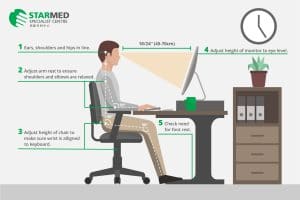
Chase that adrenaline rush: 5 unique sports activities in Singapore for weekend fun
Enjoy thrilling sports activities in Singapore and bag tips from an expert on how to safeguard yourself from a muscle strain or pull.
Did you know chronic diseases such as hypertension, diabetes, obesity, and high cholesterol, are all risk factors for heart disease & stroke?
Our Cardiology clinic at StarMed specialises in treating, preventing or delaying the progression of coronary heart disease through therapeutic lifestyle modifications, cardiac rehabilitation, and a range of surgical treatments that include coronary artery stenting, bypass surgery and more.
We treat a broad spectrum of heart diseases, as well as cardiovascular risk factors such as smoking, high blood pressure, high cholesterol, pre-diabetes, diabetes, and sleep disorders.
The clinic is led by Dr Peter Ting, StarMed’s Medical Director and Cardiologist. Specialising in preventive cardiology, Dr Ting is board certified in Lifestyle Medicine by the International Board of Lifestyle Medicine and strongly believes in providing clinical care with compassion.
Heart artery blockages develop silently and are often advanced by the time they are symptomatic. Early detection is key to preventing heart attacks or even sudden cardiac death.
Cardiac screening is recommended if you have one or more of the following:
Learn more about our Premier Cardiac Screening package here or book an appointment with us below.
Many chronic diseases such as hypertension, diabetes, high cholesterol, heart disease, fatty liver and stroke can be prevented with a healthy lifestyle. Lifestyle medicine is scientifically validated to help prevent, delay or even reverse these conditions. Let our experienced team improve your health naturally through personalised lifestyle prescriptions, reducing your need for medications or surgeries.
For those who have already experienced a heart attack, do not fear, cardiac rehabilitation can help improve their heart condition and stamina, develop healthier habits, return to work and physical activity faster, and reduce their risk of a second heart attack.
Older individuals often do not respond the same way to conventional heart disease treatments. Geriatric cardiology is a branch of cardiology that deals with cardiovascular disorders in older people. It incorporates both traditional evidence-based cardiovascular management plus comprehensive geriatric assessment, medication reduction, team-based coordination of care, improving functional outcomes, and consideration of patient goals.
StarMed’s Cardiologist, Dr. Peter Ting, has a diploma in geriatric medicine with experience in treating elderly cardiac patients and their families, and tailors each treatment according to their complex conditions and unique needs.
Our priority is to:
Looking for an alternative to stents or surgery? Contrary to popular belief, many asymptomatic heart artery blockages do not require invasive surgery or stenting.
Reversal of heart blockages is possible through a combination of monitoring, therapeutic lifestyle modifications and medications. We have successfully managed numerous patients with heart artery blockages without resorting to stents or surgery.
Arrange an evaluation with us today to see if this option is suitable for you.
Ambulatory blood pressure monitoring or carrying a monitoring device with you allows your blood pressure to be measured at regular intervals in a day, whether you are awake or asleep. The information recorded on this device allows our doctors to study your blood pressure in a normal environment. It is a useful and reliable method to evaluate the type of hypertension a person may have. It is also used to assess the effectiveness of high blood pressure medication on a patient.
Price Range
Medisave Claimable
The coronary angiogram or cardiac catheterisation is diagnostic procedure used to plan treatment for certain cardiovascular conditions. During the procedure, a long thin tube called a catheter is inserted into an artery or vein in the groin or arm. It is then threaded through the blood vessels to the heart while using X-ray imaging as a guide.
Price Range
Medisave Claimable
A computerised tomography (CT) coronary angiogram is an imaging test that looks at the arteries that supply blood to your heart. It might be done to diagnose the cause of chest pain or other symptoms. A CT coronary angiogram uses a powerful X-ray machine to produce images of your heart and its blood vessels. The procedure is non-invasive and doesn’t require recovery time. CT coronary angiograms are used to diagnose a variety of heart conditions.
Price Range
Medisave Claimable
A cardiac event monitor is a portable device that records your heart’s electrical activity (ECG), rate and rhythm.
Price Range
Medisave Claimable
A tile table test is a non-invasive procedure which involves moving you from a lying to a standing position while your symptoms and vital signs and being monitored. The test is used to evaluate the cause of unexplained episodes of fainting or dizziness.
Price Range
Medisave Claimable
An electrophysiological study is used to understand the nature of abnormal heaty rhythm (arrhythmia) and locate where it is coming from. Results can help to determine of cardiac ablation is required. A arrhythmia ablation is a procedure that uses radiofrequency energy to remove a small area of heart tissue in order to restore normal heart rhythm.
Price Range
Medisave Claimable
A Percutaneous Coronary Intervention (PCI), also known formerly as a Coronary Angioplasty, is a non-surgical procedure used to open up blocked blood vessels in the heart. Guided by X-ray imaging, a catheter is threaded through the blood vessels into the heart. At that point, a balloon is inflated to compress plaque against the walls of the artery, restoring blood flow to the heart. The balloon is then removed and a stent (tiny mesh tube) is put in place to keep the artery open.
Price Range
Medisave Claimable
An exercise stress echocardiogram measures how your heart works when experiencing added workload or “stress” of exercise. The heart is monitored with an ultrasound scan (Echocardiography) before and after exercising. A dobutamine stress echocardiogram (DSE) may be used for individuals who are unable to exercise. During DSE, a medication called dobutamine is administered to induce ‘stress’, mimicking the effects of exercise to the heart.
Price Range
Medisave Claimable
An electrocardiograph (ECG) is a machine that records the electrical signals in your heart to check for signs of heart disease.
Price Range
Medisave Claimable
A Holter monitor is a portable device carried in a pouch or around the neck or waist. A Holter monitor keeps a record of your heart rhythm, typically over a 24-hour period, and you will keep a diary of activities and symptoms. The recording is then correlated with your activities and symptoms. The device is useful for identifying heart disturbances that are sporadic and not readily identified with a traditional electrocardiogram (ECG).
Price Range
Medisave Claimable
A Transthoracic echocardiogram (ECHO or TTE) is a test that uses ultrasound to provide moving pictures and information on the structure and function of the heart.
Price Range
Medisave Claimable
A treadmill stress test usually involves walking on a treadmill or riding a stationary bike while your heart rhythm, blood pressure and breathing are monitored. Our doctors may recommend a stress test if you have signs or symptoms of coronary artery disease or an abnormal heart rhythm (arrhythmia).
Price Range
Medisave Claimable
A Transoesophageal Echocardiogram (TEE) is a test that produces clear images of the heart and its arteries using high-frequency soundwaves (ultrasound). Unlike the standard echocardiogram, ultrasound from the TEE is administered through a thin flexible tube, inserted into the mouth, guided down the oesophagus and positioned behind the heart.
Price Range
Medisave Claimable
Transcutaneous or percutaneous valvular intervention is a minimally invasive procedure that replaces a malfunctioning heart valve with a manufactured valve. The procedure uses a flexible tube (catheter) to carry and deploy the replacement value to the heart through the blood vessels.
Price Range
Medisave Claimable


Enjoy thrilling sports activities in Singapore and bag tips from an expert on how to safeguard yourself from a muscle strain or pull.

Like many people, you may not give bone and joint health much thought until you experience pain or other problems.

Whether you realise it or not, what you do – and don’t do – every day can have a huge impact on your joint health. Here, orthopaedic and physiotherapy experts share five ways you could be harming your joints – and what to do differently.
The Circuit Breaker period has seen many lifestyle changes among Singaporeans due to the Circuit Breaker measures implemented by our government.

Ergonomic is the field of science that focuses on improving the work environment to optimise efficiency and comfort at work. Ergonomic care also aims to minimise injuries to the body and to maximise productivity at work.
The anterior cruciate ligament (ACL) makes up one of the 4 main ligaments of the knee. In fact, it is the most important and commonly injured ligament, accounting for almost half of knee injuries worldwide.

Enjoy thrilling sports activities in Singapore and bag tips from an expert on how to safeguard yourself from a muscle strain or pull.

Like many people, you may not give bone and joint health much thought until you experience pain or other problems.

Whether you realise it or not, what you do – and don’t do – every day can have a huge impact on your joint health. Here, orthopaedic and physiotherapy experts share five ways you could be harming your joints – and what to do differently.
The Circuit Breaker period has seen many lifestyle changes among Singaporeans due to the Circuit Breaker measures implemented by our government.

Ergonomic is the field of science that focuses on improving the work environment to optimise efficiency and comfort at work. Ergonomic care also aims to minimise injuries to the body and to maximise productivity at work.
The anterior cruciate ligament (ACL) makes up one of the 4 main ligaments of the knee. In fact, it is the most important and commonly injured ligament, accounting for almost half of knee injuries worldwide.
By subscribing, you agree to our Privacy Policy and Terms of Use & Service.
Subscribe to our newsletter to get your dose of news and updates from StarMed.